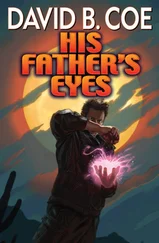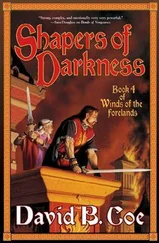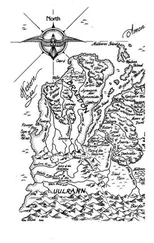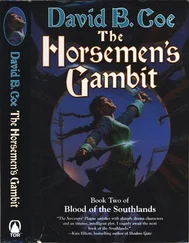Val had not thought too much about what would happen if she was made to perform one of these trials herself. The choice of celebrity was down to the viewing public, who usually picked on the most obnoxious and made him, or her, go through the ordeal day after day. Since she was determined to be cheerful, likeable and friendly to everyone, no matter what the circumstances, she was confident that it wouldn’t happen to her. And now, in fact, was the perfect opportunity to put this resolve into practice: for Danielle had just glanced over towards her and offered her a weak smile and a tiny wave of the hand, a tentative but unmistakable invitation to conversation. With a slow, effortful heave, pushing against the humid air as if it was a cushion of dampness pressing down upon her, Val rose from her hammock and wandered over to chat to the exquisite young model. She was keenly aware, as she did so, of how flawless Danielle’s beauty was, how ragged and dowdy she herself must appear by comparison. And the age difference between them was such that she could easily have been the girl’s mother. Perhaps that, then, should be the keynote of their relationship: her attitude towards her should be motherly. She should try to be friendly, caring and protective, offering advice and wisdom as well as companionship. Val knew that she must already have made a good impression on the viewing public. This approach could only make them like her even more.
*
Back in Yardley, Alison sat at the kitchen table with a pile of newspapers in front of her, skimming through the early press coverage of her mother’s arrival in the camp.
SHE’S A NONENTITY — GET HER OUT OF THERE was a typical headline.
‘As the latest “celebrity” makes her underwhelming entry into the jungle camp,’ the article began, ‘viewers up and down the country are asking the same question: Who the hell is Val Doubleday ?’
AREN’T THESE PEOPLE SUPPOSED TO BE FAMOUS? another headline asked.
REVEALED , another one boasted: JUNGLE ‘CELEBRITY’ IS ACTUALLY PART-TIME LIBRARIAN .
‘In its heyday,’ Alison read, ‘contestants on this show used to fall into two types: has-beens and wannabes.
‘But now ageing single mother Val Doubleday (or Crabs as she is already known to the production team) represents a whole new category: never-was-in-the-first-place.’
Alison winced for the first time. ‘Crabs’, her mother had once told her in a confiding moment, used to be her nickname at school: a cruel playground twist on the initials V. D. It was alarming to learn that it had been revived by people working for this programme, and had leaked to the newspapers already. This felt ominous, somehow.
Alison pushed the papers aside and turned to her laptop. Before her mother had left for Australia, the two of them had set up a Twitter account for her. They had discussed whether to use a recent photograph or one from Val’s singing days, and had finally compromised by combining an up-to-date profile picture with a screengrab of her old Top of the Pops appearance, stretching across the top of the page as a banner photo. It all looked very smart and professional. For the first day or two the account had attracted no attention at all, but as soon as the first news of Val’s participation was published a trickle of followers appeared, and now the number had swelled to 4,752. Alison was keeping the notifications page permanently open, and she now noticed that there had been 319 new messages. Excitedly, she began to scroll through them.
The first one said:
Who the fuck are you bitch?
Followed by:
Never heard of you
U r well ugly
*Yawn* Bored with her already
I remember ur song it was shite
Vote her off! The campaign starts here #getridofVal
Your face makes me ill
U r well old
Ugh what a witch
Ha ha cunt
And so on, for tweet after tweet. After she had looked through the first one hundred messages or so, Alison decided it was time she started blocking most of the posters. It took a couple of hours to block all of the most offensive ones, not least because new tweets started appearing almost as fast as she could block them. At the end of it she felt somehow soiled, as if she had spent the morning scrubbing out a toilet without wearing rubber gloves. And still the new messages continued to appear. She was fighting a losing battle. For the time being she gave up, and went into college to check out the afternoon lectures.
A sense of unreality, of weightlessness, persisted for the rest of the day. Riding home that evening on the Number 11 bus, Alison struggled to understand that her mother was ten thousand miles away, on the other side of the world, probably asleep beneath an Australian sky in the company of a dozen people she had never met before. Her life for the last few years had been so circumscribed: how on earth would she be coping? The last piece of news she’d heard had been a text from Steve, saying ‘Just seen Val whisked off by helicopter, jungle-bound. That’s it for a few days then!’ To which she had not replied. So now she had only her own imagination to rely upon, and it was not equal to the task. Perhaps it would be best to put the whole thing out of her mind, if possible, until nine o’clock that evening, when the edited highlights of Val’s first day in the camp would go out on national television.
By five to nine she was ready on the sofa, with a big plate of brown rice and stir-fried vegetables, waiting for the programme to start. The sound on the television was muted for the adverts and it was striking how silent the house seemed, how empty, without even her mother’s subdued, untalkative presence. Alison missed her, more than she would ever have imagined possible. Would watching her on TV be the next best thing?
Sixty minutes later, she was not sure what she had just seen. Very little of her mother, that was for sure: her total contribution to the programme, including the footage of her arrival in camp, could not have amounted to more than two or three minutes. The moment when she turned up and called out ‘Hi everybody!’ seemed especially lame: the cameras lingered heartlessly on the scene for what seemed like forever, revelling in the silence that followed her greeting, zooming in to pick up the eagerness in her eyes and then, seconds later, the disappointment that clouded them. She looked so small and old, Alison thought. How could she not have noticed that before? And had she always walked with that half-stoop? Her posture was terrible. After that, in any case, she more or less disappeared from the programme, most of which was devoted to prolonged shots of Danielle the glamour model and Pete the reality star showering in their swimwear. Val made only one more appearance. She was seen chatting to Danielle on her hammock in the afternoon, while the other campmates slept.
VAL: … I thought there might be a bit more of a fuss when I arrived, that’s all.
DANIELLE: I think everyone’s just a bit tired, you know? Don’t worry about it.
VAL: For me, it was a bit of an anti-climax, after the helicopter and everything.
DANIELLE: A bit of a damp squid, yeah …
VAL: ( after a beat ) Squib, you mean.
DANIELLE: What?
VAL: That’s the expression — ‘damp squib’.
DANIELLE: Oh, I see. So you’re correcting me?
VAL: Well, a lot of people get it wrong.
DANIELLE: I thought it was ‘squid’ because, you know, squids live underwater, so they’re probably quite damp.
VAL: Yes, you’d think so. But it’s actually squib.
Читать дальше












